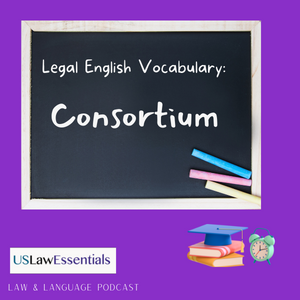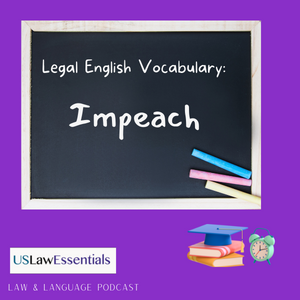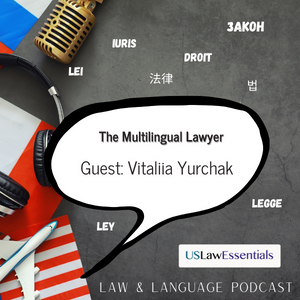Speaker 0 00:00:00 Welcome to the U S law essentials law and language podcast, the legal English podcast for non-native English speakers. That helps you improve your English, listening, improve your legal English vocabulary and build your knowledge of American legal culture. This is Daniel Adelson and welcome to the us law essentials law language podcast. This is another episode in our series on multilingual lawyers. And today I'm very excited to have a special guest. Her name is <inaudible> and she is an attorney in South Korea. Hi, how are you?
Speaker 1 00:00:46 Yeah, I get, thank you for inviting me to this show.
Speaker 0 00:00:51 Thank you. And where in South Korea are you?
Speaker 1 00:00:56 Yeah, I'm in soul. Yeah, the capital of the South Korea. How long
Speaker 0 00:01:01 Have you been an attorney?
Speaker 1 00:01:03 Uh, I have been an attorney for four years.
Speaker 0 00:01:10 And do you have your own practice or do you work for a law firm?
Speaker 1 00:01:15 Hmm, I have my own practice and this month I have opened my own office, new office.
Speaker 0 00:01:24 Congratulations. So I know that you are a hardworking attorney because it's morning here, but it's nighttime in Korea and you're still working aren't you?
Speaker 1 00:01:38 Yes, I have been working and it's 9:00 PM here.
Speaker 0 00:01:44 Wow. Well thank you for taking the time to speak with us. I know you're really busy. Can you tell us a little bit about your law practice?
Speaker 1 00:01:56 Yeah. Okay. Um, I'm Korean lawyer and, um, especially most of my clients are ex buzzing Korea and they speak in English and some of my clients are in varying countries in shirt. I have provided legal services for those who speak in English and get involved with Korean legal issues.
Speaker 2 00:02:26 That's really interesting. So your clients are either ex-pats they're from overseas and live in Korea or they're living overseas, but all of them have some sort of legal issue involving Korea.
Speaker 1 00:02:39 Yes, that's correct. I'll also, uh, either like to mention that this might sound complicated, but I sometimes deal with the foreign laws as well as Korean laws in some situations where Korean courts have jurisdiction on the case, but sometimes the gobbling law is not Korean law. So for instance, uh, I represent the south African for a divorce case in, uh, Korean family court. And at the time the coal-burning load to the case applied to the case was south African.
Speaker 2 00:03:18 That's interesting. So you practice international law, but you also practice family law
Speaker 1 00:03:22 Times. Yeah. Sometimes according to, uh, Korean international of private, uh, lows governing lows can be different.
Speaker 0 00:03:33 So in addition to family law, what kind of cases do you handle for your clients?
Speaker 1 00:03:42 Right. Main areas I have practiced are varied. So, uh, uh, dementia, the family law is mainly handling international diverse between the couplers, having different nationalities and also CVL cases, including torrent or business-related issues and also criminal cases and labor, labor, and employment issues like unfair dismissal and unpaid wages and breach of employment contracts.
Speaker 0 00:04:18 Well, so that's a really wide range of cases.
Speaker 1 00:04:22 Yes, yes, yes. And also, I don't, I do not provide visa agency services, but as you might assume, most cases of the ax bets involve visa issues. So I usually consider my clients visa status and give advice how to keep their VJs and provide some information or the worst scenario.
Speaker 0 00:04:53 Right? So that's something that lawyers have to keep in mind, especially when they are helping clients who might be citizens of a different country that sometimes civil issues and criminal issues can also have implications for visa or immigration status. What countries are your clients typically from
Speaker 1 00:05:20 For countries? My clients are from are very diverse. So us Canada, Australia, South Africa, United Kingdom, uh, Japan, Singapore, Vietnam, Philippines, Pakistan, Indonesia, uh, crane, sweat in Germany, France, Morocco, Meli covering than other countries. So basically, um, I think that our most clients are from the, uh, us or Canada
Speaker 0 00:05:55 Or, but wow. So you have so many clients from different countries. Some of the clients probably don't speak English as a first language either, right?
Speaker 1 00:06:10 Correct.
Speaker 0 00:06:12 So when dealing with clients from these different countries, what language do you speak to them in? Um,
Speaker 1 00:06:21 Basically all clients can speak in English. Of course their, um, uh, fluency will are different, but basically we, uh, communicate.
Speaker 0 00:06:36 That's really interesting. So sometimes you have a client who doesn't speak English as a first language and English. Isn't your first language, but English is the language that you communicate in. How did you learn English?
Speaker 1 00:06:56 Basically, I studied English at school. Uh, actually I haven't lived in an English speaking countries. So really around the 10, maybe 10 days, 10 days was the longest that I stayed in the U S in my life.
Speaker 0 00:07:23 Really. Have you lived in other countries? Uh, non-English speaking countries. Wow.
Speaker 1 00:07:33 Yeah, I have lived in Korea.
Speaker 3 00:07:39 Wow. So
Speaker 0 00:07:39 All your English comes from school and speaking to international people.
Speaker 1 00:07:45 And, uh, actually, um, I enjoyed learning English and also my major in university was English.
Speaker 0 00:07:56 So you mentioned that you represent clients in criminal cases also, and I was thinking that it must be so frightening or confusing for an international person to be in Korea and to have to navigate the Korean legal system if Korean isn't their first language. So what are some ways that you try to help clients who don't even speak Korean as a first language?
Speaker 1 00:08:38 One of my important roles is to, uh, communicate with my clients. And also I need to monitor, uh, whether the interpreter, uh, interprets what my client states in front of the police or at the projectors office accurately. This is very, yeah, this is very important, as you might know.
Speaker 0 00:09:12 Aha. So the defendant is, is making a statement either to the police or to the prosecutor or to a judge, but your client is making the statement in English and there's an interpreter whose job it is to interpret what the person is saying. But you have to monitor whether the, whether the interpreter is interpreting accurately. Do you have some examples of where there might be some sort of miscommunication where interpreter might not be accurately interpreting what your client is saying?
Speaker 1 00:09:52 The most of the criminal cases have many, uh, are very complicated. So, uh, if the interpreter does not have any background knowledge information on the case, then the interpreter sometimes cannot understand what, uh, what, uh, what the context, uh, the client makes the some statements in. So I need to, then I need to explain the background information, uh, to the interpreter. And also sometimes, um, some, and sometimes the interpreter interpreters make some mistakes in, uh, adding some comments to my client's statements. But as you might assume, it is very dangerous because, uh, some editing, some words can change the sentence. Um,
Speaker 0 00:11:06 When you try to help the interpreter understand better, what do you do to try to help the interpreter better understand what your client is saying?
Speaker 1 00:11:17 So, as you might know, some words have different meanings. So, uh, the, sometimes the words that the client used, uh, can be, uh, uh, translated differently. Then the whole sentence can have a totally different meaning then, uh, I correct, uh, the meaning of the word. And I, I tell the interpreter what my client originally intended.
Speaker 0 00:12:01 That's interesting. I imagine for your clients, it can be a little bit frightening at times to have to deal with a legal system in a language they don't understand. How do you try to help your clients when they're trying to deal with a language system, a legal system in another language?
Speaker 1 00:12:26 It is a very difficult question, but basically I try to, um, have my client to feel, uh, very comfortable. So, uh, I try to spend my time to, um, spend my time, much time asking questions to check out the facts thoroughly.
Speaker 0 00:12:52 There's a couple of different words for a lawyer in English. We can say that someone's a lawyer. We can say someone's an attorney. And we can also say that someone is a counselor and these words have different connotations, depending on the context. It sounds like for you, a lot of your role as like as a, as a, as a counselor, as an advisor and supporter.
Speaker 1 00:13:18 So yeah, providing, uh, counseling for my client is most important role for me, I think.
Speaker 0 00:13:30 Interesting. Can you tell me what a typical day is like for you? I know it's long, but what does a typical day lecture you?
Speaker 1 00:13:38 Yeah. Um, I come to my office around denying to 10:00 AM and read my emails and messages from my clients, or so I loop through the status of my, uh, uh, data solve the cases via the electronic courtesy system.
Speaker 2 00:13:58 Are all Korean cases now electronically filed?
Speaker 1 00:14:01 No, uh, not for criminal cases, but yes, but for, uh, the criminal cases will be OSHA filed electronically soon.
Speaker 0 00:14:13 Okay. So you, you, you come, I'm sorry. I interrupted. Do you see, come to the office, you check your email, you check the status of your cases. And then,
Speaker 1 00:14:24 And then, uh, I draft some legal briefs with reviewing the evidence or I attend the court hearing or the police or prosecutors office to represent or defend my clients.
Speaker 0 00:14:39 Do you do a lot of travel?
Speaker 1 00:14:41 Yes. So I sometimes go a trip to a remote place for a court hearing or investigation. So yesterday in order to attend the court for divorce suit, I went to sunshine, which she, yeah. Uh, it is two hours and half distance from soul by train. Yeah. By train.
Speaker 0 00:15:07 So a number of your clients are also located in other countries. What are some of the challenges when you're representing a client who is in a country different from your own,
Speaker 1 00:15:21 Uh, the clients who are, uh, located in foreign countries do not see, do not meet me in person. So we have to communicate via emails or phone calls. So as you might assume, there is time difference. So we need to yeah. Arise the time difference, but it is not easy to communicate with them only via emails, but even though they are in foreign countries, I have tried to do my best in dealing with their cases. So there are some examples, there are some successful examples of my clients who are in a foreign countries. So Sarah, some divorce cases. So, um, I filed a case divorce case, and then my clients won the case. So, um, with the court decision, uh, I could execute, uh, the granted money from the other party and I could wire the money to the clients in foreign countries. But
Speaker 2 00:16:47 It sounds like one challenge would be to have clear communication with these clients who are in another country, because you're not even able necessarily to see them. And perhaps you wouldn't be able to judge their understanding by their expression. Yeah,
Speaker 1 00:17:05 Yeah, that's correct. So, um, I focus on, uh, giving update on the case to the clients in foreign countries. So right after the court hearing, I summarize what was stated in the court hearing. It is very, uh, it is the most important thing, uh, for me to, can my client update.
Speaker 0 00:17:37 Yes. That's one of the, uh, attorneys ethical responsibilities.
Speaker 2 00:17:42 Is there a particular family law case or international case that you could introduce to us?
Speaker 1 00:17:48 One, the cases that I want to introduce to you is, um, about returning a child. So do you know, uh, Hague convention for up the opting abducting children,
Speaker 2 00:18:06 Right? The hae convention is an international agreement and it governs civil procedures in the event that a child is abducted.
Speaker 1 00:18:20 Yes. So, uh, if a child is abducted, then the, the countries which he met the convention, which is joined the conventions, um, shoot, uh, cooperate the other country in returning the child, it's still country. So, uh, yeah, one of my client is located in, uh, one of the countries, European countries and, um, he's son was abducted to Korea. So yeah. So, um, I filed a case to claim that the child should be returned to my client and eventually my client won the case. Uh, the case, uh, went to the, even to the third trial, went to the Supreme court.
Speaker 0 00:19:30 Eventually they might.
Speaker 1 00:19:31 Yes. Yes. But eventually my client won the case.
Speaker 0 00:19:36 That must've been a really emotional case.
Speaker 1 00:19:40 Yes, yes. It was very difficult. And Osage whom I know the other party is the child's mother.
Speaker 0 00:19:51 It sounds like it was a very difficult issue, both legally and emotionally.
Speaker 1 00:19:59 Yes. Yes. It was.
Speaker 0 00:20:05 You also mentioned that you work on labor and employment law cases. Can you provide us, um, can you provide an example of the type of employment law cases you work on?
Speaker 1 00:20:17 Uh, unfortunately many employers make, uh, the contract, which he have, um, many illegal closes, which are all gained. So labor standards act, but many of the expats do not know whether they are illegal or whatnot.
Speaker 0 00:20:44 Right. So you have to educate your clients about these awful clauses.
Speaker 1 00:20:50 Yes. I need to, uh, provide some base information, uh, uh, about the, their rights as a employee.
Speaker 2 00:21:01 I'm sure you provide invaluable representation for ex-pats, who are employed in South Korea and have labor law issues.
Speaker 3 00:21:10 Yes. Thank you.
Speaker 0 00:21:12 Do you have any advice that you would give to new lawyers? Well, um,
Speaker 1 00:21:22 I think I still have a long way to go to a compared to the lawyer who can give, uh, the new lawyers or good advice. But if I have a chance to give some advice for the new lawyers, then I have to choose one or two of the most important virtues for a lawyer. Then I'd, I would like to say that communication skills with clients and a willingness to provide the clients with customized services. So the cases or legal issues in the same areas might seem very similar at the first glance. But if we look into the cases, most of them have their own issues and they need different approaches. So we need to try to fully understand what issues the case have and what solution the client nice in solving the legal issues.
Speaker 0 00:22:33 Well, that sounds to me like great advice.
Speaker 3 00:22:36 Yeah. Thank you.
Speaker 0 00:22:39 Well, thank you very much. It sounds like you're providing a lot of really important, helpful services for expatriates injury and also for your international clients. Thank you so much for joining us on the U S law essentials lawn language podcast. Okay.
Speaker 1 00:22:56 Yeah. Thank you very much for inviting me to this show and I feel greatly honored to be with you.
Speaker 0 00:23:07 And thank you very much for joining the U S law essentials law and language podcast. Our guest, you and Joan one's information is in the show notes. You can learn
[email protected]. And if you have any questions, you can email Daniel at Daniel at us law, centrals.com. Thanks and stay essential.


